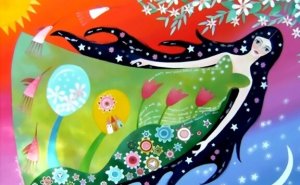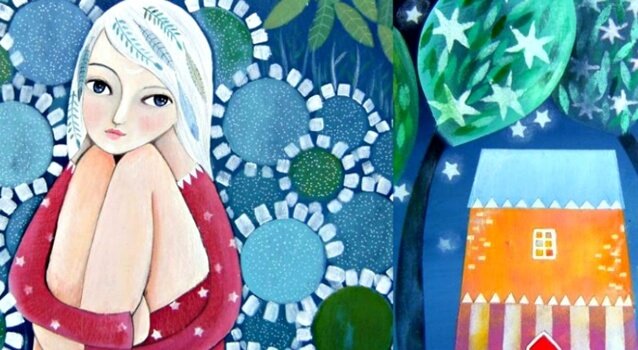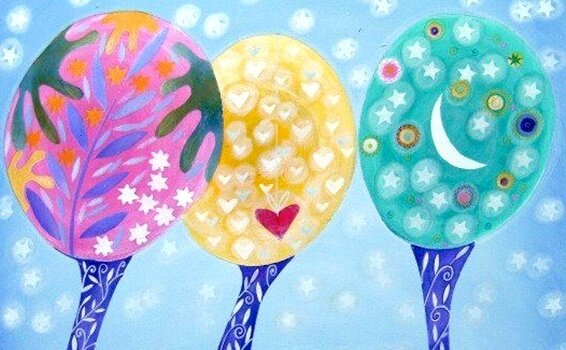To Live is to Untie Knots, to Sew Dreams, to Weave Stories


Written and verified by the psychologist Valeria Sabater
To live you must sew dreams and untie knots of the past and present, and also move forward with greater freedom. Having a life with meaning implies, in turn, that we’re wise weavers of stories. Artisans of good relationships and trackers of better spaces and environments where we can continue to grow in happiness, free of dark clouds and cold winds.
Assuming this series of ideas would undoubtedly be a good way to deal with those surprises that come your way in the complex “here and now”. An illustrative phrase about this very thing says: “Life is not about how fast you run or how high you climb, but about how well you bounce.”
That is to say, having a satisfactory reality is a subtle process where we can know how to react in times of adversity. We must understand that happiness isn’t a straight path, but rather an exercise in creativity, reaction, action, and survival.
“You only live once, but if you do it right, that’s enough.”
-Mae West
Living life is more than just existing. We know this, but sometimes we forget it. We often overlook the fact that raising ourselves as true protagonists implies several things. The first is responsibility with oneself. The second is to have passion, enthusiasm, an authentic desire to be and aspire better things. The third is to be able to endow our life with meaning.
The last term is important and we must remember it. In fact, within the current of positive psychology, it’s a word that’s becoming much more relevant than the term “happiness”. The reason? While happiness is often an entity limited in time, being able to endow our reality with a meaning will offer us something lasting, a reason for being and existing.

Can we live life our own way?
We’ve all thought about this at least once. We’ve all said that nothing can be as satisfying as living life exactly how we want, at the frequency where everything sounds better. In that special tonality where everything shines, as if it were a Monet painting.
However, as we learn sooner or later, this isn’t always possible. Free will is little more than an illusion, and this is true for two reasons: our social context and our genetic conditioning limit us.
Moreover, in the interesting book Designing Positive Psychology, published by several representatives of positive psychology, we learn that even our own culture tells us how we should be happy. Our society even tells us what vital goals we should aspire and what we must change about ourselves to get happiness. Although we sometimes have the idea that we’re completely free to design our lives, this is just an illusion. We’re not always completely free.
A perfect example is the advertising world. It convinces us that we must buy the latest phone to feel satisfied. Also, that there’s only one way to be beautiful, which we should all aspire so others will find us attractive. This makes it crystal clear that our psychosocial context influences us in a decisive way.

On the other hand, another aspect that our culture has instilled in us is the classic idea that happiness equals emotional comfort. Dimensions such as sadness, anger, frustration, failure, or disappointment must be camouflaged or evaded, just as physical pain is hidden with a band-aid. Knowing the cause doesn’t matter. It’s just better to limit yourself to silencing them, turning away as if they didn’t exist.
Nevertheless, these feelings exist. Negative emotions are part of human beings for a reason. These feelings are processed in the limbic system to help us survive, to live better. . .
“And now that you don’t have to be perfect, you can be good.”
– John Steinbeck
The craftsmanship of building a life with meaning
We already know that we aren’t truly free to live our life exclusively in our own way. There are limits, obligations, and norms we must respect. However, beyond those inescapable principles that mark our coexistence as social beings, we must open our eyes and leave behind the knots that hold us back, that hinder movement and personal freedom.
Many of these knots are created through our culture, our families, our social relations. . . even through the weight of a markedly patriarchal society. We must, therefore, intuit them and leave behind those uncomfortable ties that impede our personal growth.

Finding meaning will help us lead a fuller existence. It’s also essential to understand one thing. We know that this approach encourages us to be more present and to appreciate the here and now. However, we must also take a step further to ask ourselves the following: what do I want for tomorrow? How do I want to see myself in the near future?
The answer to these questions will give you a meaning for your present. They will clear your path, giving you hope and motivation. Only then will you be a better weaver of stories and builder of dreams, according to your vital objectives.
To live you must sew dreams and untie knots of the past and present, and also move forward with greater freedom. Having a life with meaning implies, in turn, that we’re wise weavers of stories. Artisans of good relationships and trackers of better spaces and environments where we can continue to grow in happiness, free of dark clouds and cold winds.
Assuming this series of ideas would undoubtedly be a good way to deal with those surprises that come your way in the complex “here and now”. An illustrative phrase about this very thing says: “Life is not about how fast you run or how high you climb, but about how well you bounce.”
That is to say, having a satisfactory reality is a subtle process where we can know how to react in times of adversity. We must understand that happiness isn’t a straight path, but rather an exercise in creativity, reaction, action, and survival.
“You only live once, but if you do it right, that’s enough.”
-Mae West
Living life is more than just existing. We know this, but sometimes we forget it. We often overlook the fact that raising ourselves as true protagonists implies several things. The first is responsibility with oneself. The second is to have passion, enthusiasm, an authentic desire to be and aspire better things. The third is to be able to endow our life with meaning.
The last term is important and we must remember it. In fact, within the current of positive psychology, it’s a word that’s becoming much more relevant than the term “happiness”. The reason? While happiness is often an entity limited in time, being able to endow our reality with a meaning will offer us something lasting, a reason for being and existing.

Can we live life our own way?
We’ve all thought about this at least once. We’ve all said that nothing can be as satisfying as living life exactly how we want, at the frequency where everything sounds better. In that special tonality where everything shines, as if it were a Monet painting.
However, as we learn sooner or later, this isn’t always possible. Free will is little more than an illusion, and this is true for two reasons: our social context and our genetic conditioning limit us.
Moreover, in the interesting book Designing Positive Psychology, published by several representatives of positive psychology, we learn that even our own culture tells us how we should be happy. Our society even tells us what vital goals we should aspire and what we must change about ourselves to get happiness. Although we sometimes have the idea that we’re completely free to design our lives, this is just an illusion. We’re not always completely free.
A perfect example is the advertising world. It convinces us that we must buy the latest phone to feel satisfied. Also, that there’s only one way to be beautiful, which we should all aspire so others will find us attractive. This makes it crystal clear that our psychosocial context influences us in a decisive way.

On the other hand, another aspect that our culture has instilled in us is the classic idea that happiness equals emotional comfort. Dimensions such as sadness, anger, frustration, failure, or disappointment must be camouflaged or evaded, just as physical pain is hidden with a band-aid. Knowing the cause doesn’t matter. It’s just better to limit yourself to silencing them, turning away as if they didn’t exist.
Nevertheless, these feelings exist. Negative emotions are part of human beings for a reason. These feelings are processed in the limbic system to help us survive, to live better. . .
“And now that you don’t have to be perfect, you can be good.”
– John Steinbeck
The craftsmanship of building a life with meaning
We already know that we aren’t truly free to live our life exclusively in our own way. There are limits, obligations, and norms we must respect. However, beyond those inescapable principles that mark our coexistence as social beings, we must open our eyes and leave behind the knots that hold us back, that hinder movement and personal freedom.
Many of these knots are created through our culture, our families, our social relations. . . even through the weight of a markedly patriarchal society. We must, therefore, intuit them and leave behind those uncomfortable ties that impede our personal growth.

Finding meaning will help us lead a fuller existence. It’s also essential to understand one thing. We know that this approach encourages us to be more present and to appreciate the here and now. However, we must also take a step further to ask ourselves the following: what do I want for tomorrow? How do I want to see myself in the near future?
The answer to these questions will give you a meaning for your present. They will clear your path, giving you hope and motivation. Only then will you be a better weaver of stories and builder of dreams, according to your vital objectives.
This text is provided for informational purposes only and does not replace consultation with a professional. If in doubt, consult your specialist.







